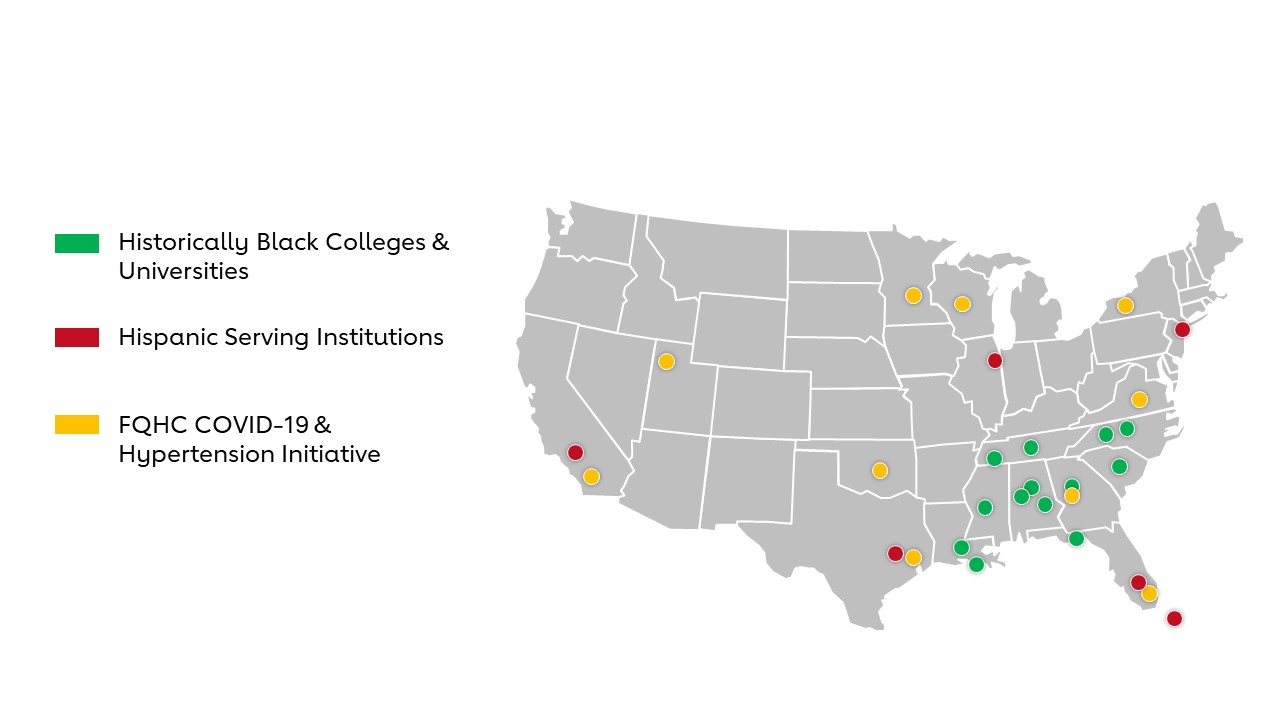
(NewMediaWire) – October 07, 2021 – DALLAS – The American Heart Association (AHA), the leading public health nonprofit devoted to a world of healthier lives for all — through a significant commitment from Quest Diagnostics — has announced an aggressive expansion of several key initiatives designed to reduce health inequities in vulnerable communities while increasing the ranks of diverse health care professionals.
This commitment will support and expand the Association’s Historically Black Colleges and Universities (HBCU) Scholars program. In addition, Quest’s support will enable the Association to launch the inaugural class of its Hispanic Serving Institutions (HSI) Scholars Program.
Quest is also working with the Association on a new initiative to help provide evidence-based high blood pressure resources to Federally Qualified Health Centers (FQHC) that serve under-resourced communities most severely impacted by the COVID-19 pandemic.
Expanding AHA’s Black and Hispanic Scholars Program
As part of a shared strategic focus on addressing disparities in health care, the American Heart Association and Quest Diagnostics will help launch the research and health care careers of over 100 diverse students at nearly 30 HBCUs and HSIs over the next two years. Quest’s support will also increase the amount of each cash award for scholars in the existing HBCU Scholars cohort from $2,500 to $7,000 and provide funding for ten additional research stipends at five more HBCUs, making this the largest cohort since the program started in 2015.
Modeled after the Association’s existing HBCU Scholars program, the new HSI Scholars Program will provide career mentorship, leadership development and research stipends to promising Hispanic students in STEM fields who are attending HSIs in California, Florida, Illinois, New York, Texas and Puerto Rico.
According to the Association of American Medical Colleges and the United States Office of Minority Health, fewer than 6% of all physicians are Black people and less than 7% are of Hispanic heritage.
Because of the lack of diversity in health care practitioners today, clinical research studies published in the American Journal of Public Health suggests that patients of color may actually experience uncomfortable interactions and communication barriers with their health care providers as a consequence of implicit and unconscious bias among physicians and other health care professionals. These barriers, in turn, can lower patients’ trust in the overall health care system and as a result, these patients may not complete prescribed treatments or follow-up on recommended care.
College sophomores, juniors and seniors from historically underrepresented communities with a 3.0 GPA or higher, who are currently enrolled in an HBCU or HSI and seeking a professional degree in biomedical and health sciences, are eligible for the program. Accepted students are selected based on their completed application which includes an essay and a recommendation from their school. During the program year, the scholars are paired with a mentor, participate in a leadership development program, and are awarded a research stipend and funding to participate in professional development and networking meetings. More about the individual HBCU Scholars can be found here. Additional information about the HSI Scholars can be found here.
“We are deeply committed to increasing diversity among health care professionals through our Scholars programs,” said Nancy Brown, chief executive officer of the American Heart Association. “This platform represents community-led solutions to address health disparities.”
Helping Community-Based Health Centers
Since 2015, the Association has collaborated with community-based health centers nationwide to address gaps in care, support quality care coordination and improve patient outcomes, but the current conditions make the need even greater. These health centers will continue to play an important role in responding to the pandemic and in providing access to care for communities disproportionately affected by COVID-19.
“The opportunity to live a long, healthy life is a fundamental human right,” said Brown. “The COVID-19 pandemic has brought inequity to the forefront of public health. The American Heart Association has long been a champion of health equity and we are honored to work with Quest Diagnostics in our shared values and commitment to address these core challenges.”
To address health disparities among Black, Hispanic and Indigenous communities, Quest has also committed to support the Association’s efforts to provide evidence-based hypertension resources and COVID-19 Rapid Response Funds in 10 targeted health centers, including five serving Native Americans in Milwaukee, Oklahoma City, Salt Lake City, San Diego and the Twin Cities (MN).
“Addressing health inequity in today’s unprecedented environment, will require novel and disruptive approaches and solutions,” said Steve Rusckowski, chairman, chief executive officer and president of Quest Diagnostics. “We are proud to team up with the American Heart Association on our shared goals to advance innovative solutions like the Scholars programs, hypertension control and COVID-19 rapid response to help empower better health in the communities we serve.”
About the American Heart Association
The American Heart Association is a relentless force for a world of longer, healthier lives. We are dedicated to ensuring equitable health in all communities. Through collaboration with numerous organizations, and powered by millions of volunteers, we fund innovative research, advocate for the public’s health and share lifesaving resources. The Dallas-based organization has been a leading source of health information for nearly a century. Connect with us on heart.org, Facebook, Twitter or by calling 1-800-AHA-USA1.
###
For Media Inquiries:
Tresa Chambers, tresa.chambers@heart.org, 214.706.1978
For Public Inquiries: 1-800-AHA-USA1 (242-8721)
heart.org and stroke.org